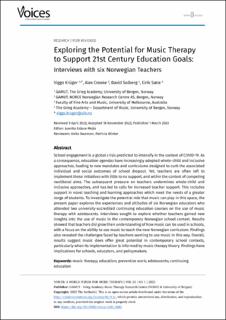| dc.contributor.author | Krüger, Viggo | |
| dc.contributor.author | Alexander, Crooke | |
| dc.contributor.author | Solberg, David Hope | |
| dc.contributor.author | Sæle, Eirik Aurlund | |
| dc.date.accessioned | 2023-11-16T08:43:43Z | |
| dc.date.available | 2023-11-16T08:43:43Z | |
| dc.date.created | 2022-12-12T19:17:47Z | |
| dc.date.issued | 2023 | |
| dc.identifier.issn | 1504-1611 | |
| dc.identifier.uri | https://hdl.handle.net/11250/3102902 | |
| dc.description.abstract | School engagement is a global crisis predicted to intensify in the context of COVID-19. As a consequence, education agendas have increasingly adopted whole-child and inclusive approaches, leading to new mandates and curriculums designed to curb the associated individual and social outcomes of school dropout. Yet, teachers are often left to implement these initiatives with little to no support, and within the context of competing neoliberal aims. The subsequent pressure on teachers undermines whole-child and inclusive approaches, and has led to calls for increased teacher support. This includes support in novel teaching and learning approaches which meet the needs of a greater range of students. To investigate the potential role that music can play in this space, the present paper explores the experiences and attitudes of six Norwegian educators who attended two university-accredited continuing education courses on the use of music therapy with adolescents. Interviews sought to explore whether teachers gained new insights into the use of music in the contemporary Norwegian school context. Results showed that teachers did grow their understanding of how music can be used in schools, with a focus on the ability to use music to teach the new Norwegian curriculum. Findings also revealed the challenges faced by teachers wanting to use music in this way. Overall, results suggest music does offer great potential in contemporary school contexts, particularly when its implementation is informed by music therapy theory. Findings have implications for schools, educators, and policymakers. | en_US |
| dc.language.iso | eng | en_US |
| dc.rights | Navngivelse 4.0 Internasjonal | * |
| dc.rights.uri | http://creativecommons.org/licenses/by/4.0/deed.no | * |
| dc.title | Exploring the potential for music therapy to support 21st Century education goals: interviews with six Norwegian teachers | en_US |
| dc.title.alternative | Exploring the potential for music therapy to support 21st Century education goals: interviews with six Norwegian teachers | en_US |
| dc.type | Peer reviewed | en_US |
| dc.type | Journal article | en_US |
| dc.rights.holder | (c) 2023 Viggo Krüger, Alex Crooke, David Solberg, Eirik Sæle | en_US |
| dc.description.version | acceptedVersion | en_US |
| dc.description.version | publishedVersion | en_US |
| cristin.ispublished | true | |
| cristin.fulltext | postprint | |
| cristin.fulltext | original | |
| cristin.qualitycode | 1 | |
| dc.identifier.doi | https://doi.org/10.15845/voices.v23i1.3642 | |
| dc.identifier.cristin | 2092238 | |
| dc.source.journal | Voices: A World Forum for Music Therapy | en_US |
| dc.source.volume | 23 | en_US |
| dc.source.issue | 1 | en_US |

